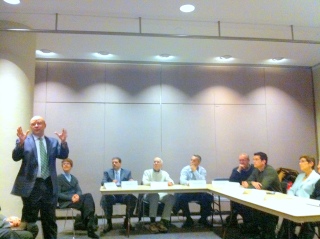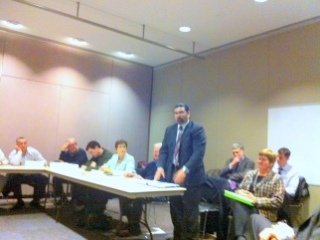
The State has hired Project for Public Spaces (PPS), a nonprofit consulting firm, to make recommendations for a public market near Haymarket to showcase “Made in Massachusetts” foods. The announcement was made at the fifth meeting of the Parcel 7 and 9 RFP Advisory Committee, a group of citizens tasked with creating guidelines for development on two parcels adjacent to the Greenway. PPS is the same consultant previously hired by the Boston Redevelopment Authority for a similar Market District Feasibility Study.
Jeffrey Mullan, Transportation Secretary, and Scott Soares, Agriculture Commissioner, said the State has $4 million funded so far out of an estimated $10 million in seed money needed to get the public market built out. PPS was awarded $130,000 to complete the study by April 2011. The State is targeting the public market to open in 2012.

The Public Market is expected to be located on 30,000 square feet inside the ground floor of the Parcel 7 parking garage building between Congress Street and Surface Road. The location has been empty since the building was developed ten years ago as part of the Big Dig.
Soares said there are 7,100 farms in Massachusetts, up 27% since 2002. Cranberries are the top crop, generating $70 million of the total estimated $500 million of farming revenues in the State. The growth in local farms is attributed to the “buy local” trend and less development of agricultural land. In addition, the State actively promotes “Agri-Tourism.”
A representative for the Haymarket Pushcart Association said it was important that the local public market does not compete with the Haymarket vendors. Commissioner Soares said they do not anticipate the local public market will sell bulk wholesale fruits and vegetables in direct competition with Haymarket which is supplied by the Chelsea Wholesale Produce markets. In answer to a question about winter products, Soares said the market could sell year-round products such as fish, cheese, grains, jams and preserves. Developer Phil DeNormandie spoke from the audience about his desire to sell beef from his 500 acres of local cattle farms.

Many participants at the meeting strongly advised PPS to consider a Parcel 9 ground-level marketplace and the outside sidewalk area of Parcel 7 as part of the business plan for the local public market. The adjacent triangular shaped, unbuilt Parcel 9 plot is expected to have some type of market on its ground floor. This space could be used for pushcart vendors looking for a more permanent retail space. Today’s outdoor Haymarket is only open Thursday through Saturday.
Despite a sign saying “Boston Public Market” on the site, the State said the non-profit organization named the Boston Public Market Association has not been designated for the site. Although the BPMA has long advocated for the site, the State expects to pursue a competitive bidding process.
There was also a discussion about how the RFP process for Parcel 9 and the rest of Parcel 7 should continue before the Public Market study is completed. An ongoing series of public meetings is expected.
Correction: This post was edited to clarify a statement made by Commissioner Soares that incorrectly said the local public market would not sell fruits and vegetables to avoid competition with the Haymarket vendors. In fact, Parcel 7 local public market will sell local fruits and vegetables, but not bulk produce from the Chelsea Wholesale Produce markets which supplies Haymarket.
Related posts:
Parcel 7 & 9: Advisory Committee Moves to Next Stage
MassDOT Advisory Committee Leaning Toward 2-Story Market Hall for Parcel 9




Why shouldn't it sell fresh fruits and vegetables? The Haymarket vendors sell whatever they got from the wholesale market on the cheap. – they are not selling freshly picked, local produce. The indoor market is a perfect venue to do so. I don't think they are competing for the same customer (whole foods v. johnny foodmaster), but even if they were, so what? This is an opportunity to have a great foodhall in a publicly owned building that has been vacant for years. Haymarket vendors should not have veto power over this parcel, nor over parcel 9.
I agree with Mary. I don't buy from the pushcart vendors, I go to the Copley Square Farmers Market. The vast majority of the people who buy from these pushcart vendors are not from the North End, the Waterfront or the West End anyway, they are coming here on the T from other places. Let's get some better food for people who live here and want it. The people who want the cheap pushcart produce will still come here to buy it.
Contrary to Mary and Heather's opinion, there are a lot of people (and restaurants) in the North End, Waterfront, and West End who shop at the current Haymarket venue and have been doing so for years. I see plenty of college students and young professionals carrying back that "cheap produce" you speak of with such disdain. I think a Public Market that showcases made in MA products is a good idea. But I also think that Haymarket serves a purpose in providing affordable produce to ALL residents of Boston including the ones who come by "T". Not everything is about people who live iin the North End/West End/Waterfront who can afford to shop in Whole foods and the Copley Sq Farmers Market. I find the snobbish attitude to be totally unnecessary.
How is it a snobbish attitude to want a variety of options? No one is saying that the current vendors should be pushed out in favor of the proposed market. Haymarket provides an extremely valuable resource to residents, and should absolutely continue and thrive. Personally, I stop at Haymarket almost every week on my way back into the neighborhood to pick up a bag of produce. I also recognize that it allows a great many people to eat more healthfully than they probably could afford to otherwise; my employer does a lot of work on childhood and community obesity prevention, and Haymarket is a resource we know is incredibly valuable to that work.
That said, I'd very much like a convenient option to support local farms when I can, too – especially if they are there more than just Friday and Saturday. I'd be thrilled to see local, grass-fed beef available, too. I don't think selling local produce as well would overly impact the current Haymarket vendors, since as Heather noted we're likely talking about different sets of customers here, and also because prices on local produce would likely be quite a bit higher.
This post was edited in the fifth paragraph to clarify a statement made by Commissioner Soares that incorrectly said the local public market would not sell fruits and vegetables (to avoid competition with the Haymarket vendors). In fact, Parcel 7 local public market will sell local fruits and vegetables, but not bulk produce from the Chelsea Wholesale Produce markets which supplies Haymarket.
It's not "snobbish" to want quality food options instead of the picked over stuff the vendors sell. I see floods of people come in on the T to our neighborhood to buy from the pushcart vendors while those of us who want better options have to go outside the neighborhood. There should be options for everyone.
I commented that a local foodie market and Haymarket are not competing for the same customer. There was nothing about whether one or the other was "better" nor anything that should be regarded as disdain. Don't read snobbishness into my simple market analysis. I like variety. I have goodwill purchased clothes alongside items purchased brand new. No conflict –
My points were
1. I think they can co-exist.
2. the vendors shouldn't be able to dictate how publicly owned property is used*
(*that seemed to happen with Parcel 9, when an all-but-selected-project was axed and sent back to the drawing board, at the expense of taxpayers who suffer the idle property).
Thanks, Matt, for the clarification – it mitigates some of my concern.
I agree, although if they compete for the same customer in some cases, I don't see that as a bad thing. Young professionals in the neighborhood have disposable income and might also like some more options at Haymarket. There will always be plenty of people shopping @ the pushcart vendors. They will always make money.